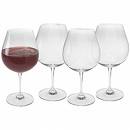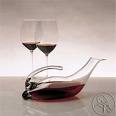Over the holidays I was pleasantly surprised to come across a great deal on a Riedel crystal decanter at Target. That’s when it hit me. Everyday people – not just wine geeks like me – have discovered the aesthetic of fine stemware.
 Here is the simple truth: The wine tasting experience is enhanced by the use of a decent glass. The glass doesn’t have to be Riedel, Eisch or Schott Zwiesel. Any glass with a fairly generous bowl and a thin lip will do when you’ve been used to small, clunky glasses with a fat, rolled lip.
Here is the simple truth: The wine tasting experience is enhanced by the use of a decent glass. The glass doesn’t have to be Riedel, Eisch or Schott Zwiesel. Any glass with a fairly generous bowl and a thin lip will do when you’ve been used to small, clunky glasses with a fat, rolled lip.
Georg Riedel, who aggressively marketed his stemware by stressing the improved taste of wine sipped from the proper shape for a particular grape variety, might explain the technical aspects of this phenomenon, but the casual wine enthusiast has made this transition anecdotally, I think.
You’re dining out and order a good bottle of red wine, eye the cheap industrial 5-ounce glass before you, and instinctively ask the waiter if there is the option of a better glass. Restaurateurs know the drill, and generally will produce finer stemware upon request.
Why do we do this? Because the wine tastes better. The most critical aspect of glass selection is the size and shape of the glass. In general a larger glass, somewhere between 12 and 15 ounces, is the most useful and practical because that’s a good size for both red and white wines.
The larger bowl allows for a generous pour – say five ounces – without filling the glass. This leaves plenty of room for swirling, which will aerate the wine and bring out flavors and aromas that would otherwise be muted.
There is a common misconception that a good glass might improve a mediocre wine, but that’s not the case. A good glass will simply allow a wine to achieve its full aromatic potential, whatever that potential might be.
 And decent wine glasses needn’t be horribly expensive. Hand-blown Riedel stemware can cost upwards of $75 per stem, and Baccarat even more. But there is no reason to go there unless the goal is to impress someone.
And decent wine glasses needn’t be horribly expensive. Hand-blown Riedel stemware can cost upwards of $75 per stem, and Baccarat even more. But there is no reason to go there unless the goal is to impress someone.
Every major department store, and discounters such as Target, now carry above-average stemware, often well below $10 per stem. And most of these are dishwasher safe, although the thinness of the glass and the delicacy factor require cautious handling.
At two of the major wine competitions I manage we use Riedel’s Vinum stemware (which is widely available and priced modestly). All of the glasses are washed in a large industrial hotel dishwasher without any serious issues over breakage or scratching.
And I should point out our wine judges taste reds, whites and sparkling from the same glasses. My good friend Ed McCarthy, author of Champagne for Dummies, even recommends drinking fine Champagnes from what would normally be considered ‘white wine’ glasses rather than the traditional Champagne flute.
The added capacity allows for the swirling that unleashes the delicate aromas of Champagne and shows off the complexity of a top-notch sparkling wine. Don’t try that with a flute!
8
